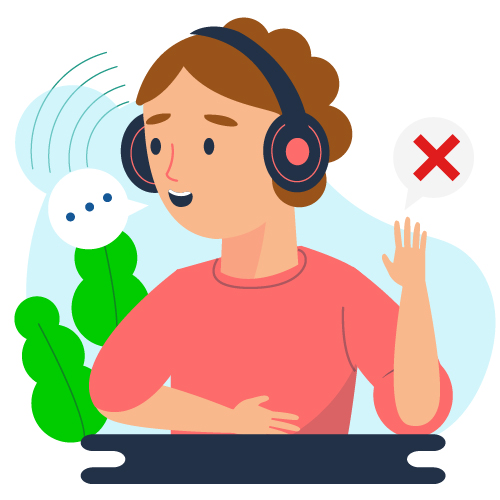Is vocabulary crucial for doing well on the IELTS?
IELTS, or the International English Language Testing System, is an exam that non-native applicants who wish to relocate to an English-speaking nation take in order to work or study there. Leading universities in countries including Australia, Canada, New Zealand, the United Kingdom, the United States of America, and Ireland recognise IELTS as a prerequisite for admission.
The four areas of IELTS are Speaking, Reading, Writing, and Listening. Every question is meant to assess a distinct linguistic skill and the applicants’ command of it. Each segment is graded on a scale from 0 to 9, and an average overall score is given. English language novices receive a score of 1, while skilled and expert users receive a score of 9.
kinds of IELTS
IELTS comes in two flavors: IELTS Academic, which students take, and IELTS General Training, which professionals and employers take. Writing and Speaking parts are different, but the Listening and Reading sections stay the same.
IELTS exams can be taken either electronically or on paper. The computer-based test is identical to the paper-and-pencil test with the exception that the reading, writing, and listening components are computer-based. Before or after the other portions, the Speaking examination is administered during a face-to-face interview with the examiner. Within three to five days of taking the test, the results are released.
The candidate physically travels to the testing location and completes the Reading, Writing, and Listening parts on paper for the paper-based exam. A week before or after the other parts, an examiner will conduct a face-to-face interview for the Speaking section. Within 13 days of the exam’s completion, the paper-based test’s results are released.
IELTS preparation strategies
IELTS preparation is similar to exam preparation in general. When students enrol for IELTS, IDP provides them with a variety of free practise exams or mock exams, which they are encouraged to complete before taking the test. The mock exam is identical to the real test in terms of question and answer formats, time constraints, and degree of difficulty.
Vocabulary is vital to getting a high band score on the IELTS exam, which measures a candidate’s grasp of the English language. Any score over six is considered good, and a large vocabulary is frequently the key to the applicant achieving that mark.
Candidates should be familiar with regularly used expressions and idioms and be aware of their proper application and meaning. The test is not very challenging, but in order to correctly answer the sections, you must comprehend the underlying meanings and connotations.
How to increase vocabulary for the IELTS test
Studying for a vocabulary test does not automatically result in enhanced vocabulary. It has to be developed over time. By reading, hearing, and then using these words in conversation or writing, vocabulary can be improved passively.
Candidates can expand their vocabulary by using the following advice:
Write down new words you encounter so you may learn their meanings and context. Afterward, attempt to smoothly blend these terms into your speech or writing.
Pronunciation and enunciation will improve if you watch videos and listen to podcasts of native English speakers. Candidates can watch the speeches and videos of Stephen Fry and Barack Obama because they are both skilled orators. Additionally useful knowledge sources are Ted Talks.
Concentrate on the homonyms and synonyms of terms that are often used in speech.
If you continue to practice before the final exam, getting a good overall band score in IELTS may get simpler. Candidates are encouraged to take many of practise exams since they will boost their vocabulary and give them the confidence they need before the exam. Increasing your vocabulary can help you achieve a higher IELTS score.
Learning new words is only one aspect of vocabulary building
Aspirants frequently believe that memorizing a lengthy number of terms would enable them to broaden their vocabulary. The less they understand that vocabulary development goes beyond just acquiring new words
Don’t only concentrate on studying word lists. Make it a habit to memorize them with the text instead. Understanding their meaning, being familiar with their synonyms, and honing your collocation skills are essential for using them appropriately.
Is Using Complex Words the Only Thing Vocabulary Requires?
Every time you use “difficult” or “complex” terms in your IELTS Academic or General Writing, it is clear that the examiner will conclude that you are doing this to impress them. Your score will ultimately fall since it appears strange.
You stumble or keep repeating the statement when taking the IELTS Speaking section when looking for complicated terms. As a result, you receive lower grades for your fluency.
Without a question, you should have a diverse vocabulary, but you should also know how to use it properly and sensibly. Knowing a lot of terms and randomly employing them in your essay or in conversation with your examiner without giving their meaning any thought will get you into problems.
You’ll be able to gauge your vocabulary’s size in this way, and you can then start making plans to increase it. Do not, as previously said, focus solely on memorizing additional words. Learn them in relation to their significance instead.
Read and Listen: The majority of vocabulary is acquired through context. Pick up a book, magazine, podcast, or television programme that interests you. Avoid listening to or reading anything that is not interesting to you since it will cause you to become distracted.
Words to Note: Make it a routine to write down new terms you encounter, comprehend their meaning, and learn how to use them appropriately.
Use memory techniques: Word learning alone is insufficient. It’s important to keep these in mind. As a result, you should periodically examine the terms that you have previously learned. Think about rewriting them in a week, 10 days, 2 weeks, a month, or as long you feel is appropriate.
Practice, practise: You must utilize the words you write down while speaking and writing, so keep an eye on your vocabulary on a regular basis.
IELTS exam performance is influenced by vocabulary abilities. Make sure you comprehend terminology in context in addition to just remembering it if you want to really stand out on your IELTS test. Be prepared to speak and write with ease while using your vocabulary.



